The Bible with Nicky and Pippa Gumbel, Classic Version, 2017Sample
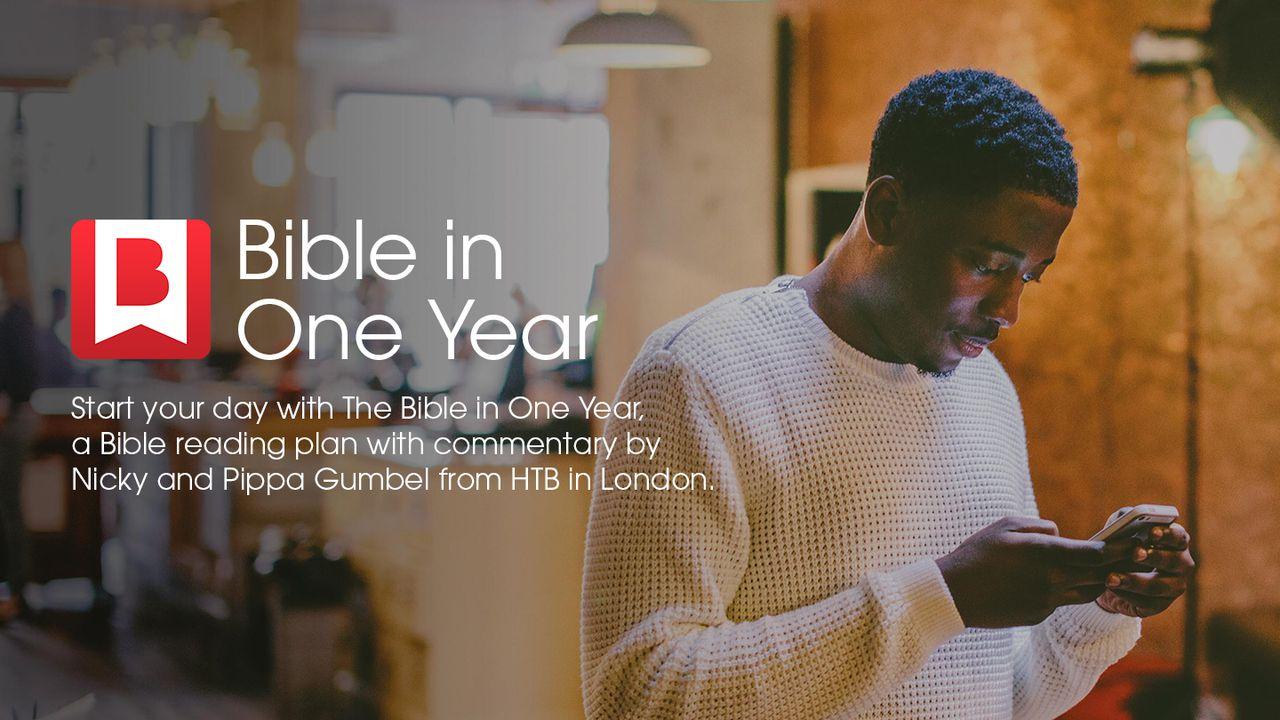
Just Relax and Let God Be God
Joyce Meyer tweeted, ‘Just relax and let God be God.’ It is a great comfort to know that a loving God is ultimately in control of everything that happens.
Bishop Sandy Millar often says in the face of some tragedy or when things had gone badly wrong: ‘The Lord reigns.’
Many times throughout the Bible, God is referred to as the Sovereign Lord. Both Joyce Meyer and Sandy Millar are expressing, in different ways, absolute confidence in the sovereignty of God.
If God is sovereign and ultimately in control, does that mean that you are absolved of responsibility for your actions? Does it mean that you do not have ‘free will’? As we see in our New Testament passage, the Bible teaches both – the ultimate sovereignty of God at the same time as human responsibility and free will.
Psalm 9:7-12
1. Confidently trust in the sovereign Lord
God is in ultimate control of the universe: ‘the Lord reigns’ (v.7). God ‘will judge the world in righteousness (rightness and equity); He will minister justice to the peoples in uprightness’ (v.8, AMP). This knowledge is an enormous comfort. We may never know in this life why God allows some horrendous things to happen.
Trust in the sovereignty of God and keep on believing that he will never forsake you: ‘And they who know Your name will lean on and confidently put their trust in You, for You, Lord, have not forsaken those who seek You’ (v.10, AMP).
In the meantime keep doing three things:
- Praising
‘Sing the praises of the Lord’ (v.11a).
- Proclaiming
‘Proclaim among the nations what he has done’ (v.11b).
- Praying
‘The Lord is a refuge for the oppressed, a stronghold in times of trouble’ (v.9); ‘He does not ignore the cry of the afflicted’ (v.12b).
Lord, thank you that you do not ignore my cries and that I can confidently trust in you. Thank you that I can relax and let you be God.
Matthew 11:16-30
2. Accept the invitation to walk with Jesus
The teaching of Jesus is fascinating. In the first section of today’s passage he seems to be saying, ‘You can’t win.’ On the one hand, John the Baptist was an ascetic and was accused of being demonised. On the other hand, Jesus went to parties with all kinds of people and made friends with those who were regarded as unsavoury characters. He was accused of being a glutton and a drunkard and a friend of tax collectors and sinners (v.18).
Whatever you do may be misinterpreted. Yet Jesus adds, ‘But wisdom is proved right by her actions’ (v.19). I take this to mean that all we can do is the right thing and not worry about what anybody else thinks. ‘Opinion polls don’t count for much, do they? The proof of the pudding is in the eating’ (v.19, MSG).
Jesus then denounces the cities that he has visited and performed miracles in, where people have neither repented nor believed. He suggests that their sin is worse than the sin of Sodom (v.24). The sin of unbelief is perhaps the most serious of all.
Jesus goes on to teach in such a way that it is clear that he believed in both predestination (that God has already determined everything that will happen) and free will. He teaches both alongside one another. It is a paradox. The two seemingly contradictory things are both true at the same time.
It is not 50% ‘predestination’ and 50% ‘free will’. Jesus says we are 100% predestined and we have 100% free will. This may seem impossible, but God is able to transcend and yet not distort human freedom. We ultimately see this in the incarnation: Jesus is 100% God and 100% human; he is fully God and fully human.
- Predestination
‘All things have been committed to me by my Father. No one knows the Son except the Father, and no one knows the Father except the Son and those to whom the Son chooses to reveal him’ (v.27).
Why God chooses to reveal himself to some and not to others is a mystery. It is certainly not based on wisdom and learning. Sometimes the great intellectuals simply cannot see it: ‘you have hidden these things from the wise and learned’ (v.25). And yet sometimes people of little or no education, or those who are very young (‘little children’, v.25), seem to have a very profound understanding of Jesus. ‘You’ve concealed your way from sophisticates and know-it-alls, but spelled them out clearly to ordinary people’ (v.25, MSG).
- Free will
Jesus says, ‘Come to me, all you who are weary and burdened, and I will give you rest’ (v.28). The invitation to come to Jesus is for everyone. No one is excluded. We are all invited. We all have a choice whether to accept the invitation of Jesus or to refuse it.
I find it difficult to get my mind around this paradox. However, I have found the following illustration helpful. Imagine a room with an arched doorway. The outside of the arch is inscribed with the words, ‘Come to me, all you…’ (v.28). In other words everyone is invited into the room. When you get into the room, on the inside of the same arch is written, ‘No one knows the Father except the Son and those to whom the Son chooses to reveal him’ (v.27b).
In other words, free will is a doctrine for everyone. No one can say, ‘I am not going to become a Christian because I have not been chosen.’ The invitation is to all. On the other hand, predestination is a doctrine of assurance for those who are Christians. Once you have accepted the invitation and entered, you can know that God has chosen you and therefore he will not let you go.
I love the words of Jesus in verse 28. In a stressful world where so many are ‘weary and burdened’, Jesus promises you rest. He offers to take your burdens and replace them with his own.
The yoke (something that Jesus would have made in the carpenter's shop) was a wooden frame joining two animals (usually oxen) at the neck, enabling them to pull a plough or wagon together. The function of the yoke is to make burdens easier to carry. I love this image of walking in step with Jesus, sharing our burdens, making the trials to be endured and the battles to be faced ‘easy’ and ‘light’ by comparison.
Jesus is not a slave driver. When you pursue his agenda for your life you carry a burden but it is ‘not harsh, hard, sharp, or pressing, but comfortable, gracious, and pleasant’ (v.30, AMP). When you do what Jesus asks you to do, he gives you the strength and wisdom to do it and you carry his burden with him. There will, of course, be many challenges and difficulties, but there will also be a lightness and ease.
Jesus says to you: ‘Are you tired? Worn out? Burned out on religion? Come to me. Get away with me and you’ll recover your life. I’ll show you how to take a real rest. Walk with me and work with me – watch how I do it. Learn the unforced rhythms of grace. I won’t lay anything heavy or ill-fitting on you. Keep company with me and you’ll learn to live freely and lightly’ (vv.28–29, MSG). Just relax and let God be God.
Lord, thank you that you promise me rest for my soul. Thank you that I can come to you today. I give to you my burdens…
Genesis 29:1-30:43
3. Watch God work his purposes out
God works his purposes out in spite of our weakness, vulnerability and sin. Jacob was a deceiver. What we sow, we reap. He sowed deception and he reaped deception from Laban (29:25b). He then continued the cycle of deception (30:37–43). This is an extraordinary story of deception, and also of unfaithfulness and disloyalty.
Yet somehow, in all of this, God worked his purposes out for the individuals involved, for Israel, for the birth of his Son Jesus and for the future of the people of God.
A lot of human sin and disappointment was involved in the birth of Jacob’s children (29:31 – 30:21). Yet, through it all, God was working out his purposes for the twelve tribes of Israel. Rachel’s prayer was finally answered with the birth of Joseph (30:22).
As God was in control of their lives, you can trust that he is ultimately in control of yours as well and that ‘in all things God works for the good of those who love him, who have been called according to his purpose’ (Romans 8:28). So, just relax and let God be God.
Lord, thank you that you use even weak, vulnerable and sinful people. Thank you that you can use me. Thank you that although you love me as I am, you love me too much to leave me as I am. Help me never to settle for second best.
Help me to take responsibility for my life and at the same time confidently trust in your sovereignty.
Pippa Adds
Genesis 29–30
I am enjoying these chapters in Genesis. The story is much better than watching a soap opera on television. Whatever will they do next?
It’s interesting that Sarah, Rebekah and Rachel all had difficulty having children (this is not a new problem). Yet each of the children who eventually arrived was hugely important in God’s plan for the people of Israel. Was God waiting for the right time or was he preparing the parents in some way? Most of Jacob’s children seem to have been born as a result of sibling rivalry and jealousy. Yet God didn’t give up on them and still managed to work out his plans.
About this Plan

Start your day with the Bible in One Year, a Bible reading app with commentary by Nicky and Pippa Gumbel. Nicky Gumbel is the Vicar of HTB in London and pioneer of Alpha. 'My favourite way to start the day.' - Bear Grylls, Adventurer
More
We would like to thank Nicky and Pippa Gumbel, HTB for providing this plan. For more information, please visit: https://www.bibleinoneyear.org/
Related Plans
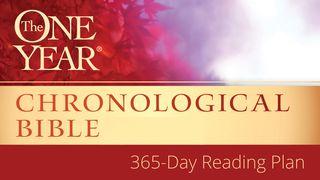
The One Year® Chronological Bible
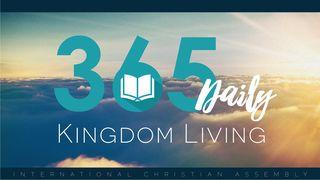
ICA - 365 Daily Kingdom Living

The Greatest Gift
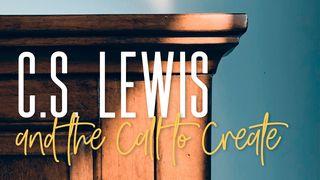
C.S. Lewis And The Call To Create

Choosing Each Day: God or Self?

Discerning The Voice Of God
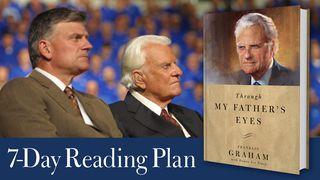
Through My Father's Eyes
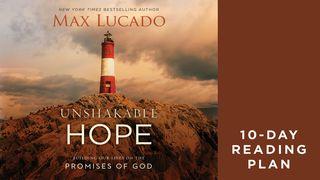
Unshakable Hope: Building Our Lives On The Promises Of God

How to Practice Gratitude in the Midst of Waiting by Wycliffe Bible Translators
